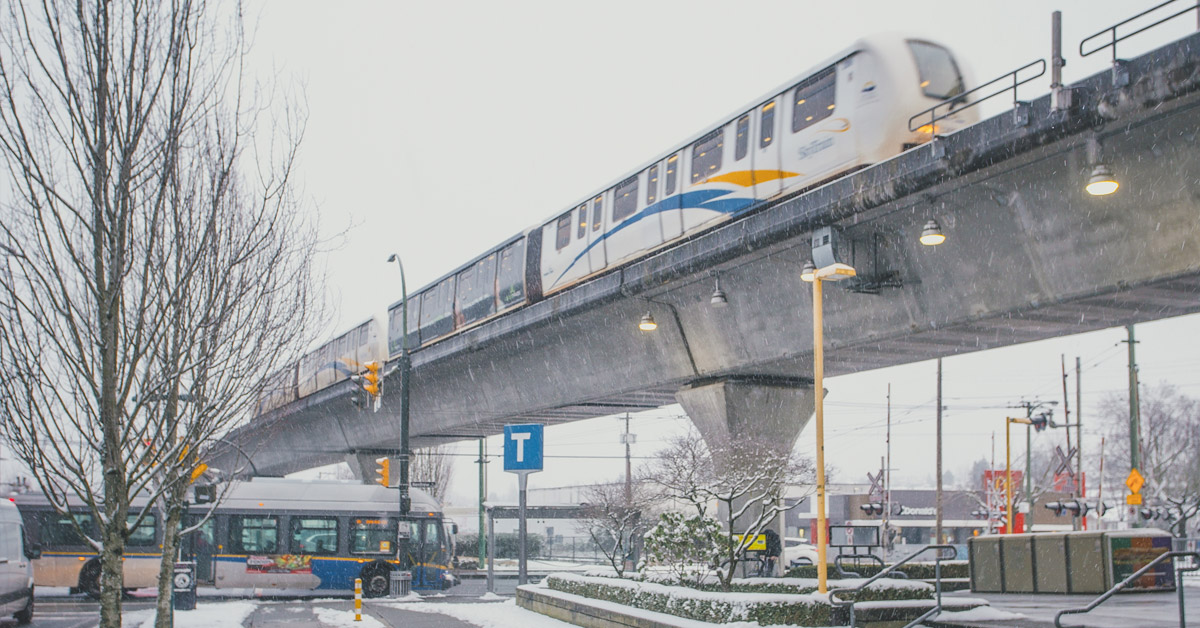TransLink preparing for winter weather
TransLink preparing for winter weather
TransLink trialling new bus tires as part of winter readiness measures

TransLink is preparing transit services for the winter season as temperatures begin to get colder throughout Metro Vancouver. Among the winter readiness measures, Coast Mountain Bus Company (CMBC) will be testing the winter performance of a newly available bus tire.
Tire trial
CMBC is trialling new winter-rated tires featuring a different tread pattern, on one third of the fleet – which equates to approximately 500 buses.
- The tires currently used on CMBC’s fleet are winter-rated tires which are replaced proactively to keep the tread in good condition. They carry the Three-Peak Mountain Snowflake rating, the highest winter rating available for bus tires.
- The tires being tested are new to the market and carry the same Three-Peak Mountain Snowflake winter rating.
- Braking, fuel economy, and wear on tire tread over time will be compared. The testing results will help inform future decisions about CMBC tires.
Winter preparation tactics
Whenever freezing temperatures are in the forecast, additional staff are called in and TransLink initiates a series of actions to help keep customers moving. Actions to keep buses moving include:
- Coordinating with municipalities on snow-clearing if priority routes are impacted.
- Spreading anti-icing solution on trolley wires with de-icing trucks.
- Using brass cutters on some trolley buses to cut through ice on trolley wires.
- Installing tire socks on buses on portions of routes with heavy snowfall and implementing snow shuttles for snow routes, depending on the weather.
- Replacing articulated buses with 40’ conventional buses on some routes, as they are more agile in slippery areas.
- Salting and sanding bus exchange walking surfaces.
“We are committed to doing everything we can to keep our customers moving,” says Coast Mountain Bus Company President and General Manager Michael McDaniel. “CMBC is committed to always looking at new policies, technology, and equipment to ensure we have the best possible service on the road. I look forward to trialling new tires to determine whether they provide extra benefits during the winter season.”
Actions to keep SkyTrain moving include:
- Using a de-icing train to keep the power rail free from ice buildup.
- Running trains overnight to stop snow from building up in the guideway.
- Coupling Millennium Line trains into four-car configurations to increase capacity.
- Positioning SkyTrain attendants at the front of each Expo and Millennium Line train to improve reliability on the system by limiting emergency braking triggered by heavy snowfall.
- Using teams on SkyTrain platforms to prevent ice build-up on the doors.
- Salting/sanding entrances and walkways for SkyTrain and West Coast Express stations.
“Our SkyTrain team is dedicated to providing the best possible service during severe winter storms,” says British Columbia Rapid Transit Company President and General Manager Sany Zein. “Our SkyTrain system is exposed to the elements, which presents challenges to keep service moving during inclement weather. The commitment by our whole team to keep customers moving and informed is exemplary, and we are prepared to do everything we can to maintain safe service this winter.”
Customer information
During days with inclement weather, transit riders are encouraged to
- Build in extra travel time and plan commutes using Trip Planner
- Sign up for Transit Alerts
- Follow TransLink on Twitter (@TransLink)
- Call Customer Service at 604.953.3333





